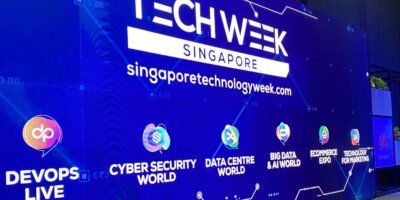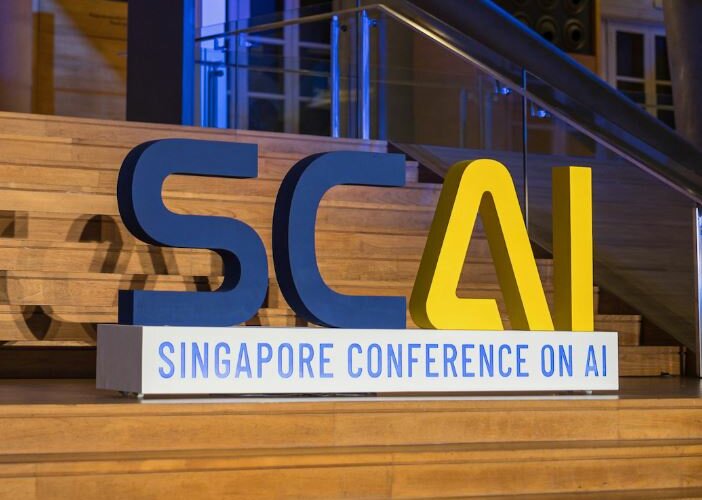
SCAI seeks to identify the critical questions of AI that impede AI’s development and deployment for the global good.
Singapore’s AI strategy 2.0 explained
- Singapore unveils its National AI Strategy 2.0.
- The strategy will focus on making Singapore a leader in the field of AI
- The country also aims to triple AI workforce to 15,000.
Even before the hype of ChatGPT and generative AI began, Singapore was a leading region in developing the technology. In fact, Singapore already had an AI strategy in place to prepare the country to understand AI and and how it could benefit its people and businesses.
The country’s first AI strategy was launched in 2019. As one of the countries that pioneered the technology in Asia, Singapore’s first strategy was focused on deepening the use of AI to transform the economy.
The country’s early investment in AI led to the establishment of around 150 teams working on research and development, as well as 900 startups exploring new ideas with AI. Since then, Singapore has witnessed significant breakthroughs in AI, resulting in the development of new products, enhanced capabilities, and transformative interactions.
Realizing the potential of the technology and its impact on society, the Singaporean government has now unveiled an updated version of its AI strategy. Called the National AI Strategy 2.0 (NAIS2.0), the strategy will focus on making Singapore a leader in the field of AI. That includes focusing on nurturing talent, promoting a thriving AI industry and sustaining it with world-leading infrastructure and research that ensures AI serves the public good.
According to a report by The Straits Times, Lawrence Wong, Singapore’s Deputy Prime Minister, said Singapore has to take a more systematic path to harness the benefits of AI for the public good while mitigating its impact on jobs and livelihoods, as well as other risks such as deepfakes, scams, cyberattacks and misinformation.
Wong, who also launched the AI Strategy, pointed out that the revised strategy expands Singapore’s focus in the inaugural 2019 strategy, which was mostly aimed at deploying AI use cases in specific sectors such as healthcare, security and education.
“Recent breakthroughs in AI have sparked renewed interest about the potential of AI, its risks and implications to humanity… Discussions about AI’s potential benefits and threats are not new, but we are venturing into uncharted territory,” said Wong.
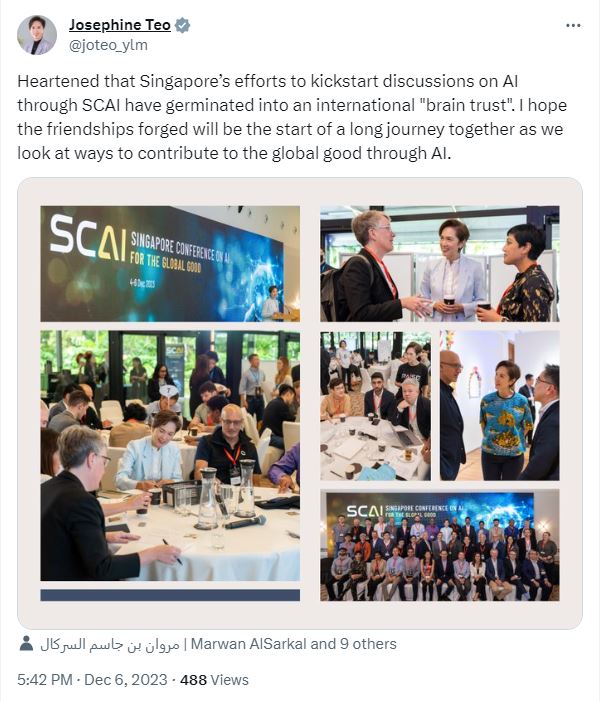
Remarks by Josephine Teo, Minister for Communications and Information, at the Singapore Conference on AI.
Singapore’s AI Strategy to include localized LLM
While China, India, Japan and Korea can be considered the leaders in AI in Asia, Singapore has been keeping tabs on the technology for some time, too. Already a leader in technology in Southeast Asia, Singapore launched the world’s first Model AI Governance Framework in 2019.
In 2022, Singapore launched AI Verify, an AI governance testing framework and software toolkit. AI Verify was made open source for developers in June 2023. The testing framework is aligned with internationally recognized AI governance principles, guidelines, and frameworks, such as those from the EU, OECD, and Singapore. The framework consists of 11 AI ethics principles and corresponding testable criteria and testing processes.
Apart from that, Singapore is also pioneering the development of an AI model trained to understand and generate human language that incorporates the diverse cultures and languages of Southeast Asia. In a statement by Singapore’s Infocomm Media Development Authority (IMDA), it was claimed that the large language model (LLM) could eventually be used as the basis of various text-to-speech or text-to-image generative programs.
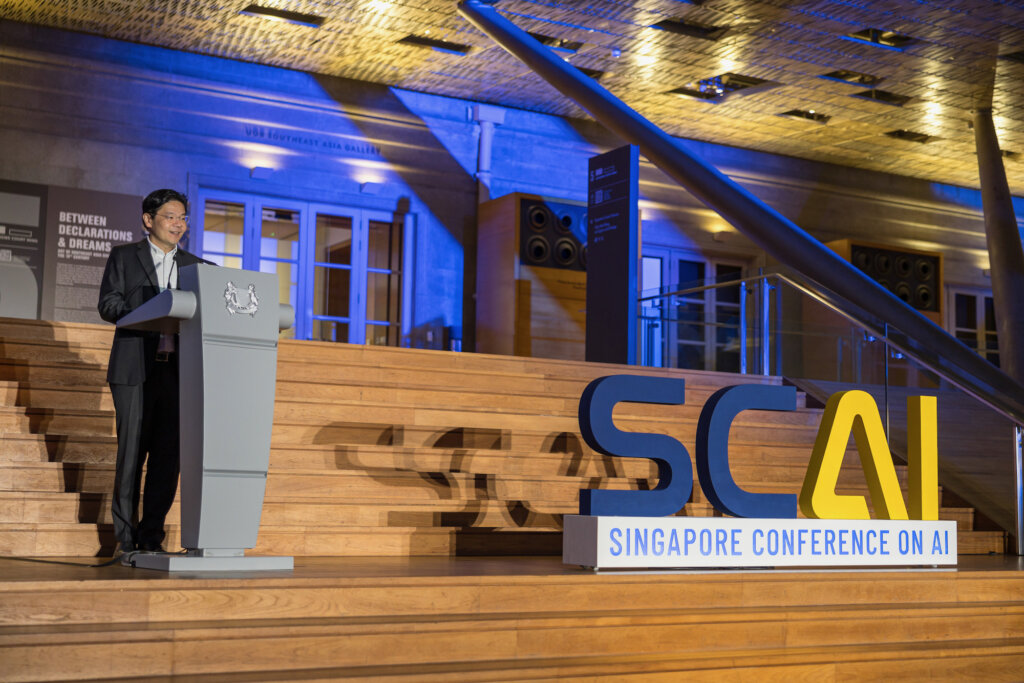
Lawrence Wong, Singapore’s Deputy Prime Minister, said Singapore has to take a more systematic path to harness the benefits of AI for the public good
Currently, most LLMs originate from Western countries, with a few being developed in China. Many feel that these LLMs have cultures, values and norms that differ from those in the region.
IMDA is partnering with AI Singapore (AISG) and the Agency for Science, Technology and Research (A*STAR) to launch the National Multimodal LLM Programme (NMLP). Funded by the National Research Foundation, Singapore (NRF), the new SG$70 million initiative will develop Singapore’s research and engineering capabilities in multimodal LLMs. In line with the Research, Innovation and Enterprise (RIE) 2025 plan, the two-year national-level initiative will also support NAIS 2.0.
“This national effort underscores Singapore’s commitment to become a global AI hub. Language is an essential enabler for collaboration. By investing in talent and investing in large language AI models for regional languages, we want to foster industry collaboration across borders and drive the next wave of AI innovation in Southeast Asia,” commented Dr Ong Chen Hui, assistant chief executive, Biztech Group, IMDA.
IMDA also stated that the NMLP will be built on AISG’s recently launched SEA-LION (Southeast Asian Languages in One Network) model, an open-sourced large language model that is more representative of Southeast Asia’s cultural contexts and linguistic nuances.
SEA-LION is designed to be relatively smaller, flexible and faster than the commonly used LLMs in the market today. It represents a relatively inexpensive and efficient option for organizations, especially the many cost-sensitive and throughput–constrained enterprises in Southeast Asia, to incorporate AI into their workflows.
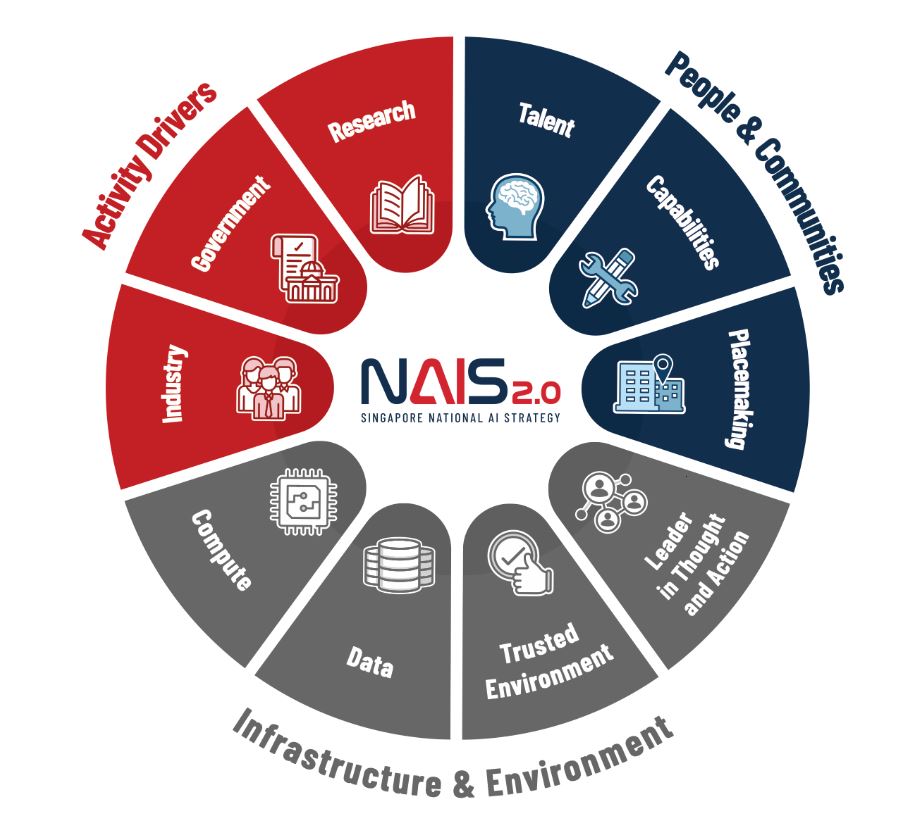
Singapore will direct efforts under NAIS 2.0 toward three systems working through ten enablers. (Source – Smart Nation).
Having sufficient talent for AI
With all this development in AI, the next thing that the country wants to focus on is ensuring there is sufficient talent in the country. Given that AI is still a developing technology, many organizations are still having a shortage when it comes to talent in the technology. In fact, tech talents remain a constant problem for organizations planning to invest in new technologies.
However, Singapore’s AI strategy will address these challenges. It includes plans to triple the number of AI practitioners in the country to 15,000. There are also plans to establish an iconic site to nurture the country’s AI community.
Specifically, NAIS 2.0 will be achieved through three systems. The first system will focus on activity drivers whereby industry, government, and public research performers have deep technical capabilities that can be applied to deliver value. The aim is to orchestrate them around meaningful use cases and problem statements to transform the economy and society.
The second system will focus on people and communities. The country plans to attract more top-tier researchers and engineers to work with and from Singapore. More of the technology workforce should work to scale novel AI solutions, that form part of the toolkit which a confident base of enterprises and workers can use.
The third and final system will focus on infrastructure and the environment. Singapore will host the necessary infrastructure and provide a trusted environment for AI innovation. This will make the country a credible leader and preferred site for AI development, deployment, and adoption. This strategy statement outlines 15 actions that Singapore will undertake across these systems and enablers, to support the country’s ambitions over the next 3-5 years.
“As AI progresses and as the rate of scientific progress increases, we will continue to adapt and evolve our rules. The key in all this is to be agile and nimble, and to keep on updating our strategies and our governance frameworks as circumstances change. That is our philosophy in Singapore,” said Wong.
READ MORE
- Safer Automation: How Sophic and Firmus Succeeded in Malaysia with MDEC’s Support
- Privilege granted, not gained: Intelligent authorization for enhanced infrastructure productivity
- Low-Code produces the Proof-of-Possibilities
- New Wearables Enable Staff to Work Faster and Safer
- Experts weigh in on Oracle’s departure from adland





